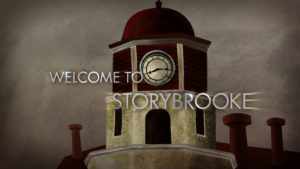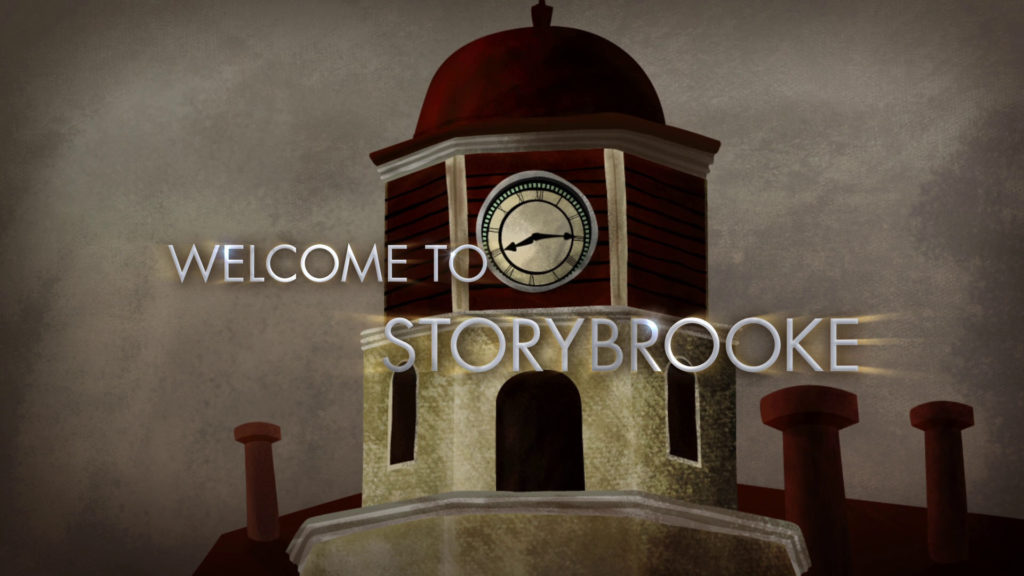Once Upon A Critique
I began watching Once Upon A Time last fall, at my sister’s insistence. The premise sounded interesting, as far as I could  understand it (something about fairy tales, the modern world, and “Storybrooke”), and at any rate, I was promised Frozen characters.
understand it (something about fairy tales, the modern world, and “Storybrooke”), and at any rate, I was promised Frozen characters.
As I watched the first few episodes, I had many questions, most of them along the lines of, “Who’s that? What’s going on? Wait – they’re related?” And again (this was a big one), “Who is that?”
My point is that while some TV series are easy to jump into, Once Upon A Time is not. No doubt my experience of the show is colored by what I missed – and evidently I missed a lot. But the half season I watched left me thinking, and I saw in it two principal flaws, and two principal virtues. The first flaw is …
A propensity toward soapy drama. It is not that Once Upon A Time is a soap opera, but you can feel it listing, at times, toward cheap emotional drama. The Snow Queen’s tragic backstory, for example, had two great pivots, both of which were chiefly marked by ludicrously implausible behavior. It was illogical and overwrought, and I felt sure that no real person would ever act the way those characters did. (They brought in the Duke of Weaselton for the story. He was less cartoonish as a cartoon.)
In Robin and Regina’s little side story, the drama was worse than unearned. It had some value, at least initially, but it quickly declined as the writers got away from any serious question of honor or happiness to indulge in the cheapest of all romantic tensions: that of a love triangle, particularly a tawdry love triangle. And as with the Snow Queen’s backstory, the drama did not bear too much scrutiny. One begins with sympathy for Regina, who started the relationship quite innocently. But one can only listen to her bemoan her wrecked happy ending so many times before one begins to wonder why this formidable woman believes that unless she keeps her boyfriend, she will be forever miserable.
The second flaw is …
Philosophical glibness. There is some profundity in the show, but it also lapses into glibness. Take the dilemma of whether people ought to get rid of their magical gifts, when they can’t control them and just may inadvertently kill people. The show resolved this question thusly: “It’s a part of you! Love yourself! Throw a party! Yay!”
You don’t need the doctrine of Original Sin to know that things may well be “part” of a human being without being at all good. We just need to observe ourselves or – where it is even plainer – the world. But you don’t need to do even that to realize how glib it is to dismiss the genuine danger of killing an innocent person with magic because it’s a part of you.
Another bit of glibness was spouted by Robin Hood, who justified breaking up his family on the grounds that that was “living truthfully”. I think this is the same essential concept as “being true to yourself”, only wrapped up more elegantly, and again reminds us that at times, it’s better to be true to somebody else. It is the morality of a narcisstic age to be true to oneself rather than being true to God, or even other people. (Like, you know, your wife.)
All this being said, Once Upon A Time has its virtues, too. It has …
An imaginative premise. Once Upon A Time is the ultimate fairytale mash-up. The idea of bringing all the fairytales together, both in our world and in an enchanted one, is bounding with potential. There is real creativity in the series, and genuine moments of suspense and humor. And the best of the series is embodied in …
Rumpelstiltskin. Rumpelstiltskin is the best kind of villain, even the best kind of character. He’s the rare character who can show an impressive mix of badness and goodness, and even act in diametrical ways, while still retaining an inner consistency. Robert Carlyle plays his part magnificently, and owns much of the credit for the unified complexity of Rumpelstiltskin. But the character shows the writers at their best, too.
 Once Upon A Time needs to be stiffened up with some good, hard logic; it would kill some of the melodrama, and even some of the glibness. Despite that, it shows enough imagination and skill to be worth attention. When it comes back after the winter hiatus, I’ll be watching.
Once Upon A Time needs to be stiffened up with some good, hard logic; it would kill some of the melodrama, and even some of the glibness. Despite that, it shows enough imagination and skill to be worth attention. When it comes back after the winter hiatus, I’ll be watching.
If for no other reason than to find out what happens to Rumpelstiltskin.





























Goodness, this is EXACTLY how I felt about OUAT! The soapy drama and shallow philosophy is why I stopped watching the show eventually – and because it got increasingly convoluted and less clever. I liked it better when it was a sharper and more streamlined twist on the classic fairy tales.
I think you’re being generous: OUAT is a soap opera, no tendencies about it. I binged a few on Netflix after the first season came out to see what everyone was raving about, and couldn’t get through much farther than episode six or seven. I found the main heroine got dumber and dumber as time went on, and suffered the OS Kirk syndrome of “Character makes stupid choices and yet is continually lauded as savior even when not.” Also everyone’s tragic backstory was due to lost love. Every single time.
But as you point out, the one saving grace the show had was Rumple. I stuck with it as long as I did just for him, but even his greatness wasn’t enough to save it for me. If you’re not on this train already I’d say don’t even try to get on. Just go watch Agent Carter instead.
Our family made it through the first season and then a few episodes into the second. Then we gave it up.
“Hi, I’m Regina. Everyone calls me the Evil Queen, because I’m Evil. Except now I’m not. I’m Good now and everyone loves me. Oh, wait. No, I’m not. Now I’m Evil and everyone hates me. No, no, wait… I met a guy. So now I’m Good again. Until something happens to that guy. So now I’m Evil.” And so on and so on and so on.
That’s in addition to all the other problems already listed by the blog and comments above…
My wife had struggled through “Once Upon A Time” and frequently shared this very response to the whole series. Literally, this is what made me brave enough to suggest we enjoy some actual cartoons together, namely the “Justice League” series. Quickly my wife concluded that the animated superheroes in this installment of the DC Animated Universe behaved with more maturity and realism than the live-action folks in “Once Upon A Time.”
DC cartoons are largely way better than their onscreen counterparts (with a few exceptions). Make sure you watch Young Justice next.
I think I’m noticing a trend. 😉 I, too, dropped the show halfway through the 2nd season. It has great potential but I got sick of the wallowing in ridiculous drama and nonsensical progress of the show. I also loved Rumple but he got progressively darker as the 2nd season progressed until I couldn’t bear to watch anymore. I don’t know if that trend continued later or if they pulled back a bit from where they were going there.
I watched all of the first season and most of season two. While i consistently felt it failed to live up to its potential, it had some truly great moments, like the scenes with Emma and her parents in the early parts of season two, the episode about Pinocchio’s back story, the Mad Hatter, and of course Rumplestiltskin.
I don’t think it was the soapiness that got to me so much as the attitude toward Regina, shared by the writers and too many of the fans. I can’t think of the last time i’ve seen anyone who had done such things be coddled that much. It’s the reason i quit watching.
Honestly, while the concept had a lot of potential i’m not sure a TV series like this was the best way to go about it. Inevitably good characters get dropped or set aside because the actors are busy with other things or the writers have to focus on the main characters. I’d almost suggest a book series, but that might have some of the same problems. Though maybe not if they left out characters like, say, Dr. Frankenstein and Peter Pan.
In general, i would recommend watching the first season and at least the first half of season two, and then writing the rest of it yourself. It doesn’t sound like it’s gotten any better since i stopped watching.
Ditto LadyArin. Might I suggest Fables, a Vertigo graphic novel series, instead? In fact, I’ve heard rumors that OUAT was originally going to be Fables but they couldn’t get the rights–which is is a shame. Or maybe not, considering how bad OUAT got.
I have watched every episode from the beginning. This is a show that, if you’re going to stay with it, you can’t miss an episode. There’s too much back story and too much building episode on episode. If you’ve missed any episodes, you’ll definitely be confused.
Sure, there are soap opera moments – I really hated the Frozen storyline – but I agree with everyone that Rumple is, hands down, the best character of the series. That is only because the actor is so good.
What I like about the series is how they interweave the different fairytales, and they do it quite creatively. I do not like Emma Swan much, and really, Henry gets on my nerves. But I love Rumple and Hook, and I watch to see how things will turn out. But it seems to me that the writers are running out of options, hence the Frozen thing. Still, Rumple in the real world? Yeah, I’ll keep watching just to see what he does. There are a lot worse shows out there – yes, a lot better – but I’ve invested several seasons, so I’ll keep going for now.
I love OUAT, but I watch it on Netflix, so I don’t have to deal with missing episodes and I can walk away when the inconsistencies get to me. This is a story that, somewhat like Lost and the Walking Dead, lets villains have heroic moments and heroes show their darker sides. I love that in writing. But, yes, it is heavily infested with post-modern philosophy and has its soap opera moments. And, those frustrate me, which is when I hit pause and watch something else — or write something else.